Friday, June 6, 2025. Annette’s Roundup for Democracy.
Fight the bill.
Why you need to keep calling your Senators, red and blue.👇
The U.S. Capitol Switchboard operator can connect you directly with the Senate office. (202) 224-3121.
Yes. People Will Die.
Joni Ernst’s cringey videos were wrong. They also reveal a lot about the GOP’s desperately dishonest sales job.
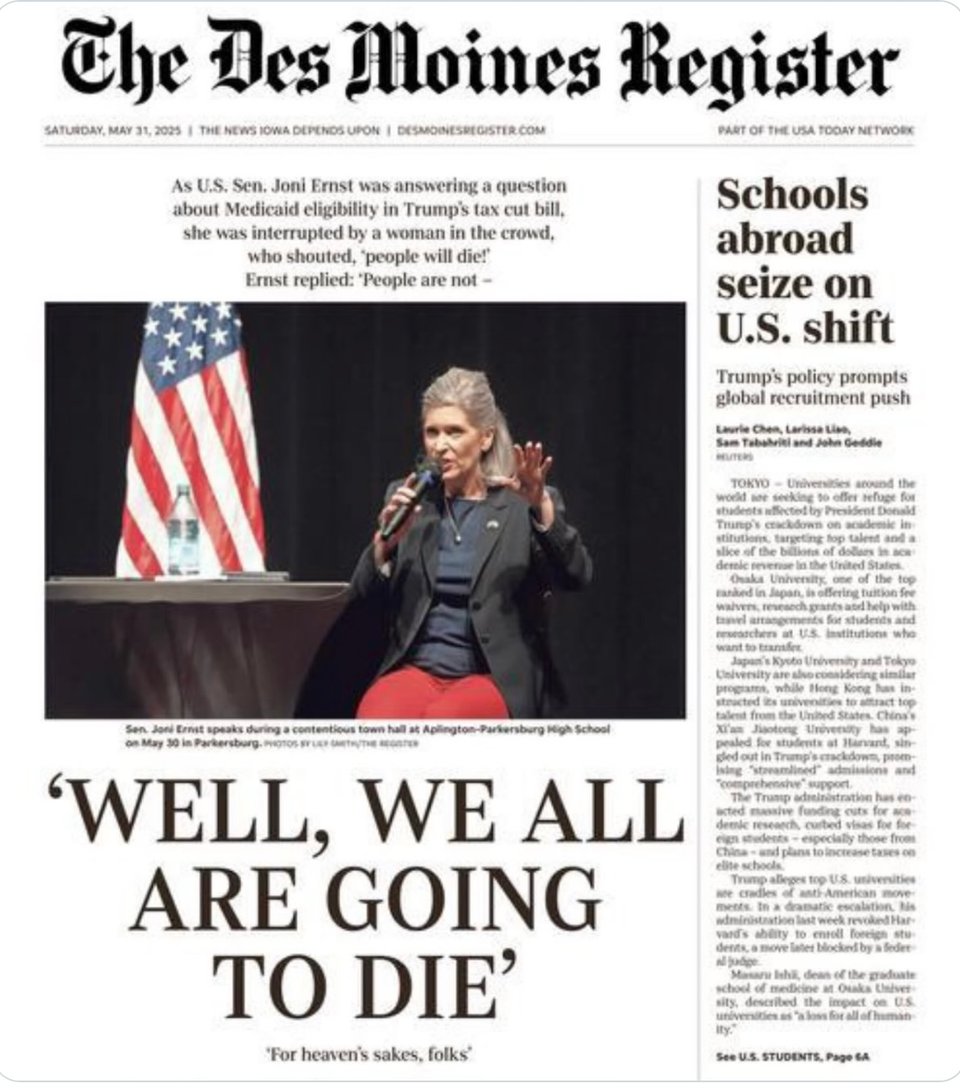
Iowa’s top newspaper isn’t too pleased with their Senator.
BY NOW, YOU HAVE PROBABLY SEEN or heard about the clips of Senator Joni Ernst trying to defend proposed health care cuts in the “Big Beautiful Bill” Republicans are rushing through Congress.
If you haven’t, by all means check them out, and not simply because they are so bizarre. Ernst’s comments are also among the best illustrations yet of how dishonestly Donald Trump and the Republicans are trying to defend their legislation—and how desperately they want to hide its potential impact, which includes real harm to many millions of people.
The saga started last Friday at a town hall meeting where the Iowa Republican fielded questions about the bill, which the House passed late last month and Ernst and her Senate colleagues are taking up now. In the form that passed the House, the bill would slash spending on Medicaid and the Affordable Care Act’s health insurance subsidies by hundreds of billions of dollars over the next decade, with nearly 11 million people likely to become uninsured as a result.
When angry audience members shouted that some of those people losing coverage would die, an exasperated Ernst said, “Well, we are all going to die.” The resulting clip reverberated across the country. The next day, Ernst doubled down by posting an Instagram video—filmed as she walked through a cemetery—in which she said she wanted to “apologize” for revealing that human beings are mortal. “I’m really, really glad I did not have to bring up the subject of the tooth fairy as well,” Ernst said in an attempted deadpan.
That video went viral, too.
It was a distinctly Trumpian, never-say-sorry approach, though it didn’t seem to be helping her much politically. By Monday, the Des Moines Register had given most of their front page to her quote, a famous Iowa retailer was selling t-shirts mocking it, and a Democratic state representative had announced a bid to challenge Ernst in the 2026 midterms, saying the senator had been “disrespectful” to Iowans.
Disrespectful, yes. Deceptive, too.
As scrutiny over the Republican legislation has intensified, Trump and GOP leaders have deployed three main arguments in their defense: that the bill won’t cause coverage losses, that it will affect only able-bodied Americans who could be working but aren’t, and that it won’t cause anybody to suffer real financial or physical harm. None of these arguments holds up and it’s not even close.
Just a few weeks ago, a new paper that’s been the talk of the health economics field demonstrated the very point Ernst was denying at her town hall—namely, that the difference between having or losing government-provided health insurance really can be the difference between life and death.
But you don’t need to read fancypants academic journals to understand what this legislation would do if it became law. All you need to do is to talk to some people who know about Medicaid first hand, including some from right in Ernst’s backyard.
HEATHER SANDERS LIVES IN ANKENY, a small suburb north of Des Moines. She taught science to middle and high schoolers in the public schools for more than two decades, until 2023 when she became a nearly full-time caregiver to her elderly mother following a series of medical complications and injuries.
Sanders, 55, says she has had trouble finding steady work to fit around the caregiving—or that could offset the cost of getting care for her mother. “It doesn’t make sense for me to work at McDonald’s when I’d have to pay more to put my mom in a program or a home,” she told me in a phone interview on Monday.
So while she hasn’t stopped looking for work, Sanders said, she’s been leaning on savings and odd jobs to pay her bills. She’s also been leaning on Medicaid for health insurance. That’s possible because Iowa is a Medicaid expansion state, meaning it opened the program to all residents with income below or just above the poverty line.
Roughly 180,000 Iowans are among the 20 million Americans nationwide getting coverage through that expansion. They are also the ones Republicans in Washington are targeting directly with the bill’s biggest single change: a set of “work requirements” that would force states to deny insurance to anybody who couldn’t demonstrate they had employment, were looking for work, or were volunteering for at least eighty hours a month.
The legislation includes an exemption for caregiving, but it doesn’t specify what would qualify and what wouldn’t—or how prospective beneficiaries would satisfy those requirements. It also includes a lookback provision, so that failing to document activities for the past six months or year could disqualify someone from coverage.
As it happens, Iowa’s Republican governor and GOP leaders of the legislature have been pushing to create a similar state-level requirement for the past few months. It prompted Sanders to speak out at a public hearing, where she talked about her mother and her own struggles to get a job—and pushed back on the idea that people who might not fit into the narrow exemptions, or be able to document them, are somehow undeserving of health care.
Now, Sanders told me, she wants people across the country to hear the same message.
“Previously, I would never have thought I needed Medicaid,” she said. “But then you realize, hey, the people on Medicaid—they’re not just sitting around eating bon bons. It’s a lot of people who have had bad luck—their house caught on fire, or they have a disease and they can’t work, or they work in a job that doesn’t pay for insurance.”
Sanders’s appearance got some local press, and it inspired her friend and former teaching colleague Tim Garner to write his own letter to the state, protesting the cuts. In a phone interview, Garner told me that he, too, has been following the national debate—and he couldn’t help but notice that Republicans want to use money now going to health care to help offset the cost of their big tax cuts for the wealthy.
“It just feels like we’re comforting the comfortable and afflicting the afflicted,” Garner said.
SANDERS IS JUST ONE IOWAN. But it wasn’t hard to find others with firsthand knowledge of how the kinds of health care cuts now under consideration would likely harm them or their loved ones.
• Karen Maass, a retired physical therapist who worked with special needs children, told me she’s seen time and again how documentation requirements prevent even savvy, persistent people from getting help they need. And new documentation requirements are a big part of the Republican bill, which through myriad, technical-sounding modifications would make it more difficult to enroll and stay on Medicaid—and to get the Affordable Care Act’s private subsidies, too.
“I don’t think the average person has any conception of how difficult it can be to fill out the forms you are required to fill out in order to apply for these programs,” Maass said.
• Lori Hunt of Des Moines is trying to find a new job, following layoffs at the advocacy organization where she worked previously. She has been getting private coverage through HealthCare.gov, with the help of those Obamacare subsidies.
But the GOP bill would make those subsidies less valuable—once again, through a set of technical changes. And then there’s the separate possibility that Republicans refuse to renew a temporary funding boost that has made the subsidies even more valuable. “That tax credit covers basically all of my monthly bill,” Hunt said. “Without it, it would cost almost as much as my mortgage payment.”
• Terry Anderson, 67, is a retired veteran also living in Ankeny. He worries what Medicaid cuts would mean for his adult son, who has severe physical disabilities from cerebral palsy and who depends on Medicaid to pay for the in-home care that allows him to live independently.
Republicans say it’s precisely for people like Anderson’s son that they want to limit Medicaid elsewhere—that is, they’re reducing the rolls in order to ensure that coverage is available for the “truly vulnerable.” Anderson isn’t buying it. Partly, that’s because he used to work on information and data systems for the state, and he has seen how they ensnare people who don’t have the experience dealing with bureaucratic systems: “It’s basically meant to be a picket fence to get rid of people,” he said in a phone interview. “They’re just getting people off the system.”
The changes being proposed by Republicans have particular resonance for Iowa because the state has a relatively high number of people who are self-employed (frequently as farmers) or working in small businesses. That makes them even more dependent on the kind of help that Medicaid and Obamacare provide, according to Mary Nelle Trefz, advocacy network director for the Iowa nonprofit called ACES 360.
Trefz went on to note that the money flowing through these programs ends up helping Iowa economically—in part, by allowing small businesses to compete financially with larger companies that offer benefits. But the broader effects will be felt in Iowa’s rural hospitals, which are always just barely scraping by.
“The conversations I’ve had with hospital executives, they tell me they feel like Medicaid expansion has been a lifeline,” Adam Zabner, a Democratic state representative who works on health care issues, told me. “Before they were operating with maybe 10 or 20 percent of their patients who didn’t have health insurance, and they don’t think they can go back to that.”
The CEO of one rural Iowa hospital system wrote something along those lines in a recent column for the Register: “Cuts to Medicaid . . . force decisions about whether we can keep our maternity ward open, retain emergency services, or offer mental health care,” wrote Todd Patterson, CEO of Washington County Hospitals and Clinics. “These aren’t just services—they are lifelines.”
And the challenge to rural hospitals represents just one way cuts in the federal bill could have broader consequences than most people realize.
“People might have the inclination to think, ‘Well, I’m not on Medicaid, this doesn’t apply to me,’ but I really see these proposals as fundamental threats to our health care system,” said Trefz, adding later that “I think whenever we’re talking about health care, it’s important to think about the ripple effects that can have on our economy and our community—this is going to impact all of us.”
OVERALL, 93,000 IOWANS COULD END UP losing insurance if something like the House bill passes and those temporary Obamacare subsidies lapse. That’s according to an estimate from the Democratic staff of the Joint Economic Committee, but their figure isn’t much higher than an estimate from the nonpartisan research organization KFF, which in its state-by-state breakdown predicted coverage losses in Iowa of 83,000.
Newly updated projections the CBO released on Wednesday suggest coverage losses are probably going to be even higher in Iowa, and in the rest of the country as well.3 And losing insurance is no small matter. It’s certainly not a subject that deserves to be treated as fodder for bizarre selfie videos filmed in cemeteries questioning why people are so bothered by reminders of their mortality.
On Tuesday, researchers from Yale and the University of Pennsylvania calculated the effects of all the cuts in the GOP legislation, including reductions in spending on food assistance. Their conclusion: 51,000 more people dying annually.
These projections are hard to get right, and that’s an awfully big number. But the general idea that people could die because they lose health insurance is fully consistent with that new, much-discussed paper that came out last month—and a bunch of other, highly regarded studies that preceded it.
“Joni Ernst is correct that we will all someday die,” University of Michigan economist Helen Levy, coauthor of a recent Brookings Institution essay on the subject, told me in a phone interview. “But how soon that happens depends a lot on what your access to medical care is, and having insurance gives you better access to medical care.”
Republicans who believe in this bill have their reasons. They see lots of upside in smaller government and big tax breaks for the wealthy, more than enough to justify whatever downsides come from cutting health insurance for poor people.
That’s a perfectly defensible proposition, one that’s been part of debates about the size and scope of government for as long as those debates have been taking place. But it doesn’t play well politically, as Republicans have learned every time voters have punished them for such cuts.
That is why House Speaker Mike Johnson was on NBC Sunday vowing that the bill “strengthens” Medicaid while budget director Russell Vought was claiming on CNN that “no one will lose coverage as a result of this bill.” And it’s why Trump himself keeps insisting—as he did on Truth Social this week—that “there will be NO CUTS” to Medicaid.
In other words, they can’t win the political fight on the merits, so they’re lying. Whether they get away with it will depend, in part, on how many people realize what the Republican bill would really do—and whether they speak out against it, as they did at that Iowa town hall with Ernst.
“People don’t appreciate the full scale and scope of what’s at stake here,” Sarah Lueck, vice president for health policy at the Center on Budget and Policy Priorities, told me. Lueck happens to be a native Iowan with family still in the state, and said she thinks a lot about what the bill would mean for people back home. “People need to pay attention now, before it becomes reality.” (The Bulwark)
One more thing.
Yes, more reasons to call your Senators.
Millions Would Lose Their Obamacare Coverage Under Trump’s Bill.
Though Republicans are not explicitly trying to repeal the Affordable Care Act, a series of small, technical changes would substantially reduce enrollment and increase the cost of coverage.
Stand with Harvard and international students.
Harvard fought back yesterday.
Harvard files legal challenge to Trump's effort to block visas for international students
Harvard University on Thursday filed a legal challenge to President Donald Trump’s efforts to block visas for foreign students planning to attend the Ivy League college.

“Singling out our institution for its enrollment of international students and its collaboration with other educational institutions around the world is yet another illegal step taken by the Administration to retaliate against Harvard,” Harvard President Alan M. Garber said in a letter to the campus community.
Trump on Wednesday issued a proclamation to deny visas to foreign students who planned to enter the U.S. to study at Harvard, his latest attack on the prominent university.
The move followed an attempt late last month to limit Harvard's ability to enroll foreign students by revoking its certification in the Student and Exchange Visitor Program, which was temporarily blocked by a federal judge.
Harvard on Thursday amended a federal complaint and will seek to have a court "immediately halt the enforcement of the proclamation," Garber wrote in the letter.
"We hope the court will act swiftly," he wrote.
The Trump proclamation would not affect only incoming students. It states that the State Department would review existing foreign students at Harvard under F, M or J visas to determine whether their visas should be revoked.
Harvard said in its amended complaint that Wednesday's proclamation, as well as the previous attempt by the Department of Homeland Security to revoke its ability to enroll foreign students, violates its First Amendment rights.
"Each is part of a concerted and escalating campaign of retaliation by the government in clear retribution for Harvard’s exercising its First Amendment rights to reject the government’s demands to control Harvard’s governance, curriculum, and the 'ideology' of its faculty and students," the amended complaint reads.
"The government’s actions, moreover, have no basis in law," the complaint reads.
Harvard's amended complaint argues that the immigration law Trump's proclamation cites allows the president to prohibit "a class of aliens whose entry would be 'detrimental to the interests of the United States'" — and that Trump's proclamation doesn't suspend entry for a class, just people who want to attend Harvard.
"The President’s actions thus are not undertaken to protect the 'interests of the United States,” but instead to pursue a government vendetta against Harvard," it argues.
Trump and his administration have targeted Harvard and claimed that it has not done enough to combat antisemitism on campus during demonstrations against the Israel-Hamas war.
Harvard in April rejected Trump administration demands that included auditing viewpoints of the student body. In response, the federal government said it was freezing more than $2 billion in federal grants.
Garber wrote in Thursday's letter that it will defend its international students.
Harvard said in the amended complaint that the attempts to target international students harms all of its students, because Harvard "prepares them to contribute to and lead in our global society."
"International students and scholars make outstanding contributions inside and outside of our classrooms and laboratories, fulfilling our mission of excellence in countless ways," Garber wrote. "We will celebrate them, support them, and defend their interests as we continue to assert our Constitutional rights."
Read the full letter from President Garber.👇
Letter from Harvard President Alan Garber to the Harvard Community in response to Trump’s latest attack.
Post this on your social media. Make your allegiance clear.
👇

Trump and Musk fight on. Is it a game?
The Trump-Musk Relationship Ruptures in Real Time.
Trump threatens to eliminate government subsidies and contracts for Musk’s businesses, while the billionaire calls president ‘ungrateful.

WASHINGTON—Long-simmering tensions between President Trump and Elon Musk burst into the open on Thursday, as the two men traded barbs and insults, signaling the rupturing of a relationship that had been one of the most consequential in modern American politics.
Trump, publicly addressing Musk’s latest attacks on his signature tax bill for the first time, said he was disappointed in his former White House adviser and suggested he was suffering from “Trump derangement syndrome.” Musk, who spent hundreds of millions of dollars to help get Trump re-elected, shot back in real time on social media that Trump was ungrateful and wouldn’t be sitting in the Oval Office without his support.
The feud could have serious consequences for both Trump and Musk. Musk on Thursday mused on social media about starting a new political party and encouraged Republicans to side with him in his spat with Trump, as Tesla shares declined. And Trump threatened to eliminate government subsidies and contracts for Musk’s businesses.
For months, Trump and Musk had enjoyed a marriage of convenience, and the White House granted the billionaire a long leash to express his opinions publicly as he worked to cut spending through his Department of Government Efficiency. They publicly praised each other, even as frustrations festered behind the scenes.
When Musk aired his initial criticisms of the tax and spending package, Trump held his tongue, hoping to maintain a strong relationship with the billionaire. But Musk’s decision in recent days to ratchet up his attacks on the bill made their uneasy alliance unsustainable, according to people close to both men.
In the Oval Office on Thursday, Trump accused Musk of changing his tune on the legislation once he stepped down as a top White House adviser.
“I’m very disappointed because Elon knew the inner workings of this bill better than almost anybody sitting here,” Trump said.
The president attributed Musk’s frustrations to provisions in the legislation that repeal tax credits for electric vehicles. Musk’s car company, Tesla, is one of the world’s largest manufacturers of electric vehicles. “He only developed the problem because he knew we had to cut the EV mandate,” Trump said. The president also said that Musk was angry about his decision to withdraw the nomination of a key Musk ally to lead the National Aeronautics and Space Administration.
Trump noted that Musk campaigned for him during the presidential campaign, but added, “I think I would have won Pennsylvania anyway.” White House chief of staff Susie Wiles nodded her head vigorously as Trump spoke.
The speed with which the relationship between the two men has deteriorated has sent shock waves through the Trump administration, with one stunned official calling the fast-unfolding events on Thursday unbelievable. Musk’s attacks have also infuriated senior advisers to Trump, who have long been privately critical of the billionaire.
The Wall Street Journal reported on Wednesday that Trump was losing patience with Musk’s sustained criticism of the legislation.
Musk started responding on X, his social-media platform, before Trump had even finished speaking.
“Without me, Trump would have lost the election, Dems would control the House and the Republicans would be 51-49 in the Senate,” he wrote, adding, “such ingratitude.”
Musk also indicated he was fine with the electric-vehicle provisions in the legislation, even if he considered them unfairly singled out—as long as Republicans “ditch the MOUNTAIN of DISGUSTING PORK in the bill,” Musk wrote on X. He said the House bill was “never shown to me even once” and was “passed in the dead of night so fast that almost no one in Congress could even read it!”
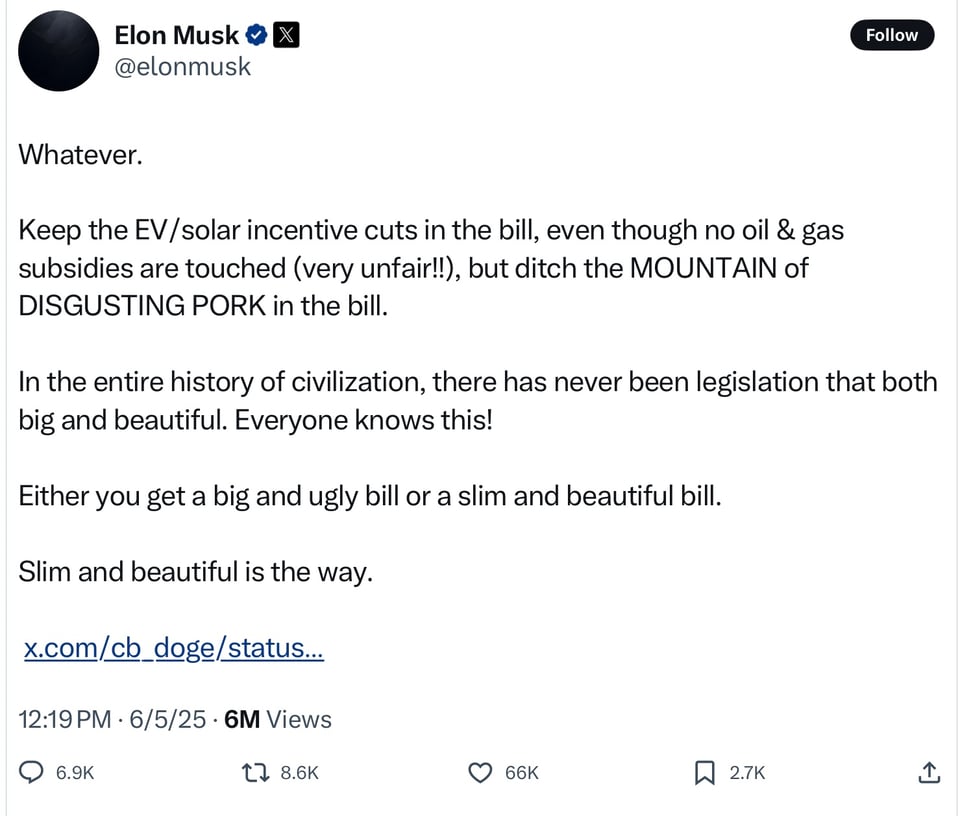
Later, Musk posted a poll on X asking his more than 200 million followers whether it was time to create a new political party that would better represent the majority of the country.
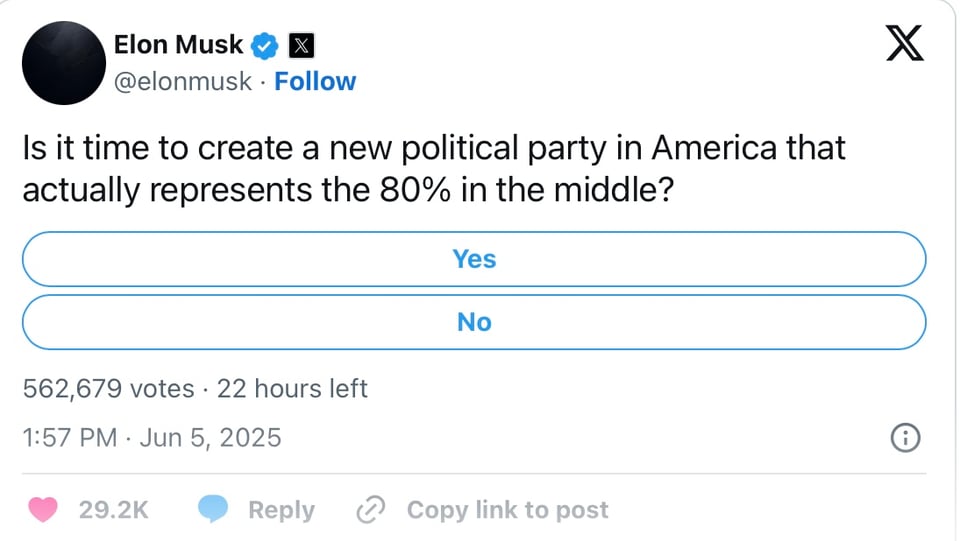
In response to a social-media post from a prominent conservative saying Republicans might have to choose sides between the two men, Musk wrote, “Oh and some food for thought as they ponder this question: Trump has 3.5 years left as President, but I will be around for 40+ years…”
Trump on Thursday suggested that Musk now suffers from what the president calls “Trump derangement syndrome,” a phrase often used by Republicans to criticize Democrats and others who oppose the president.
“He’s not the first. People leave my administration and they love us. And then at some point they miss it so badly. And some of them embrace it. Some of them actually become hostile. It’s sort of Trump derangement syndrome,” Trump said.
Trump made clear that his relationship with Musk was in jeopardy after the billionaire’s broadsides against the president’s bill. “Elon and I had a great relationship. I don’t know if we will anymore,” Trump said.
On Thursday afternoon, hours after he made his Oval Office remarks about Musk, Trump wrote on Truth Social that the billionaire “just went CRAZY” after he learned about the tax legislation’s provision ending tax credits for electric vehicles. In a separate post, Trump went further. “The easiest way to save money in our Budget, Billions and Billions of Dollars, is to terminate Elon’s Governmental Subsidies and Contracts,” he wrote.
The trigger for the public falling out has been Musk’s aggressive criticism of Trump “one big, beautiful bill,” which extends and expands tax cuts while also adding money for border enforcement and the military—partially offset by reductions in spending on Medicaid, food aid and clean-energy tax credits.
Musk’s central complaint is that the bill further expands federal deficits, adding to America’s debt burden. The House passed the GOP’s multitrillion-dollar package by just one vote last month, and Musk is hoping he can strengthen the hand of critics in Congress who have raised similar objections and force a drastic rewrite of the measure. The Senate is now taking the bill up, aiming to make changes. Trump wants it on his desk by July 4.
Republicans have a 53-47 majority in the Senate, and so far two GOP lawmakers have expressed strong opposition to the current bill: Sens. Rand Paul of Kentucky and Ron Johnson of Wisconsin. But others—including Mike Lee of Utah and Rick Scott of Florida—have some reservations, while Sens. Lisa Murkowski of Alaska, Susan Collins of Maine and Josh Hawley of Missouri have problems with other parts of the bill. Just two more from that group would be enough to potentially sink the measure, though colleagues are skeptical that the holdouts would be willing to cross Trump when it comes to a vote.
Johnson said Musk’s words were helping him make his case. “I think it has an effect—I think it helps bolster, certainly in my case, we have to address this,” Johnson said Thursday when asked if Musk’s remarks were making debt a more prominent focal point. “I’d rather not be the sand in the oyster, but I’m going to be the sand in the oyster.”
According to a Congressional Budget Office estimate released Wednesday, the package would increase budget deficits by $2.4 trillion over the next decade, compared with doing nothing.
In a meeting Wednesday afternoon with Senate Republicans revising the Senate bill, Trump and his aides worked to stamp out Musk’s deficit claims, according to lawmakers in the room. The president insisted that trillions of new investments would flow into the U.S. and that funds raised through tariffs were already helping the U.S. financial picture.
Musk also came up in the meeting. “It was almost more of a laughing conversation for 30 seconds,” said Sen. Roger Marshall (R., Kan.). “I think that’s close enough. It was very much in jest and laughing.” (Wall Street Journal).
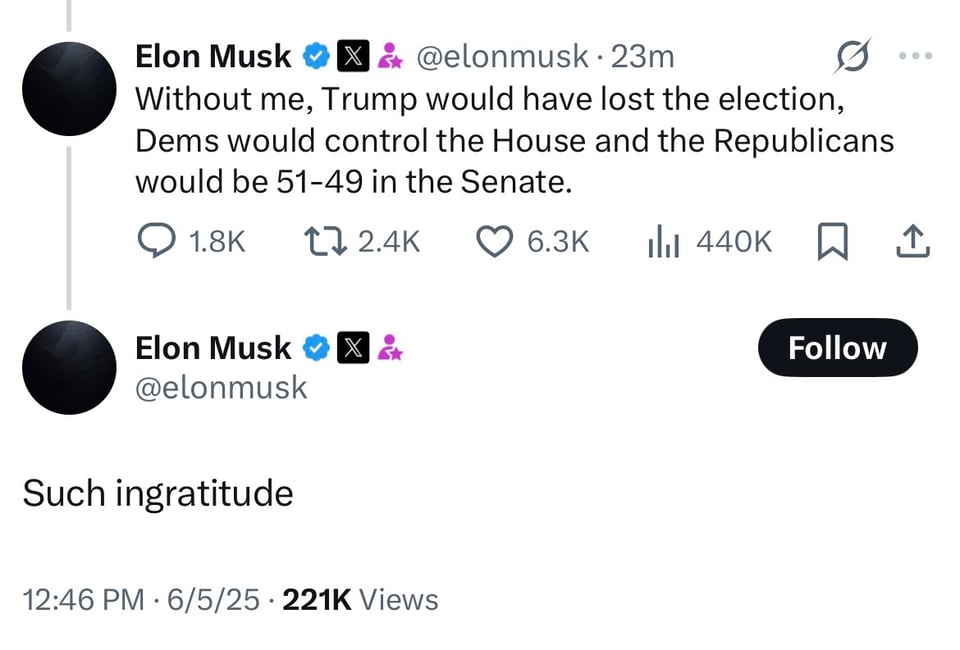
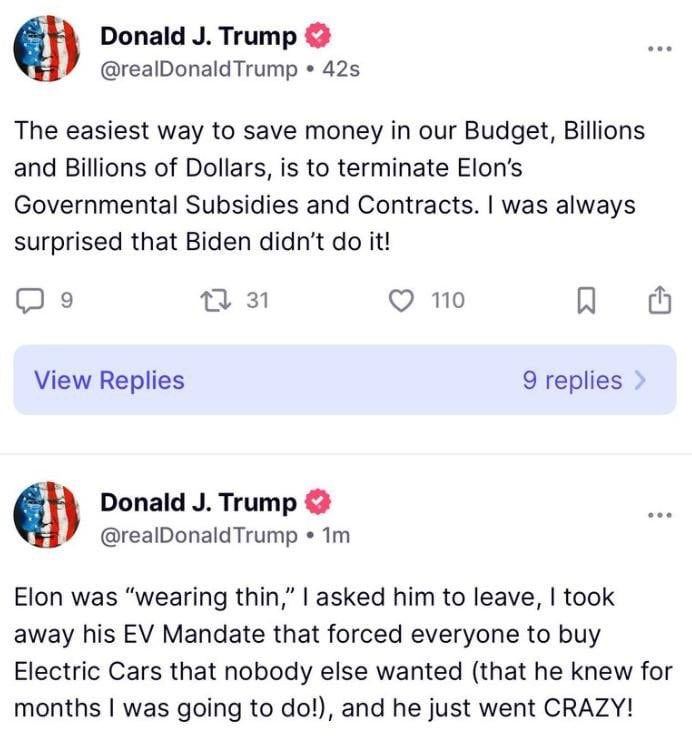
In response to President Trump’s threat to cut off federal contracts to his companies, Elon Musk said on social media that SpaceX “will begin decommissioning its Dragon spacecraft immediately.” If SpaceX were really to decommission its Dragon spacecraft, presumably the company would still bring back the one currently docked at the International Space Station and not strand the four astronauts it took to orbit. But without Dragon, NASA would find itself in an immediate bind because it does not have other readily available alternatives to carry astronauts, food or supplies to the space station. (New York Times)
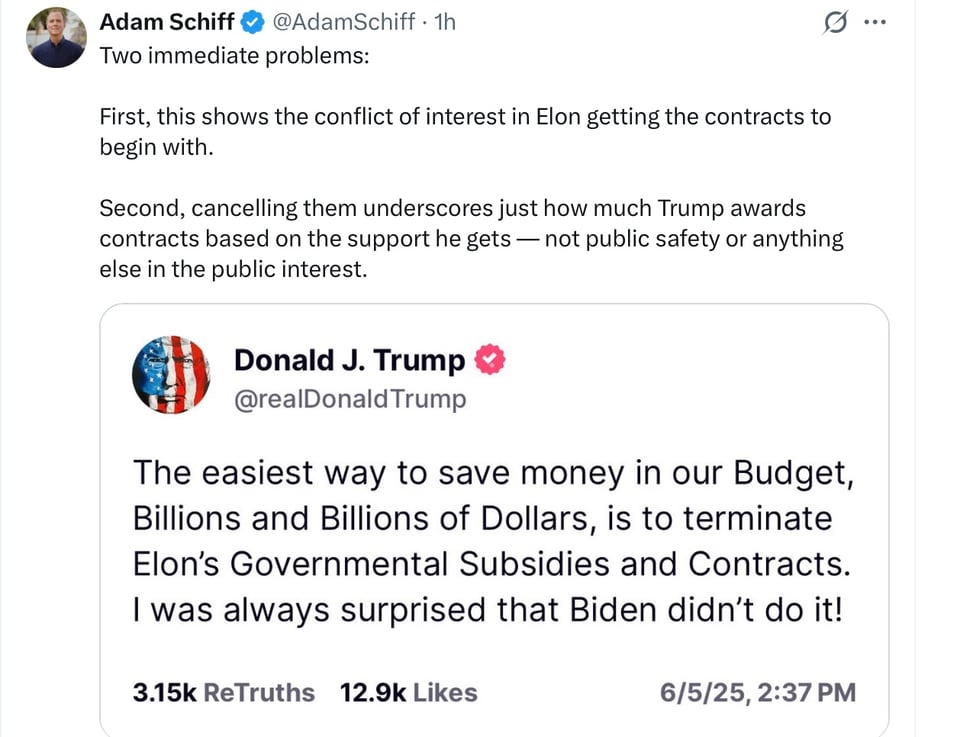
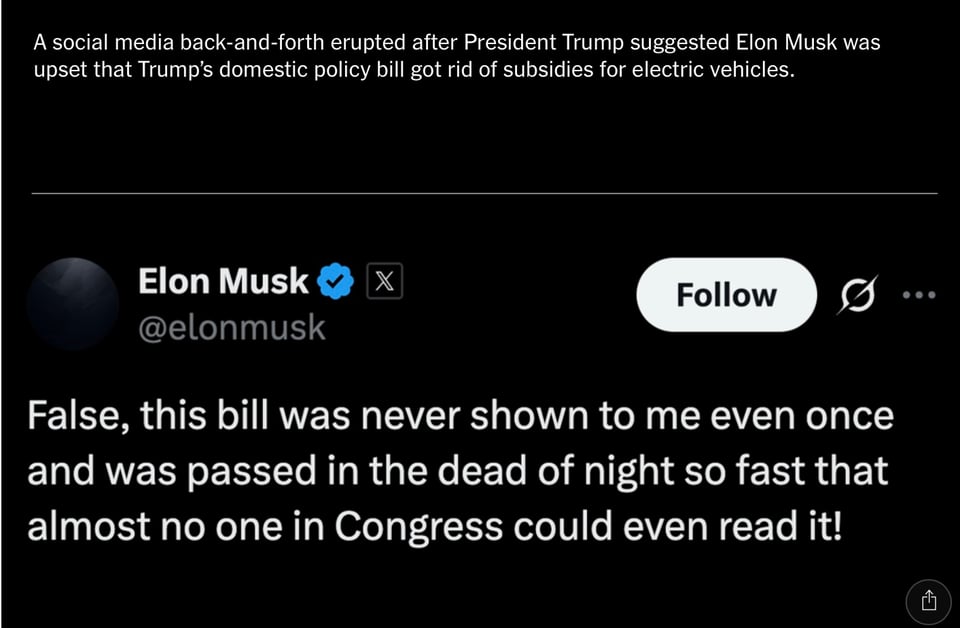
Another one. Oh he is going THERE. pic.twitter.com/SsZvj9InfA
— Victor Shi (@Victorshi2020) June 5, 2025

: Ian Miles Cheong, a prominent Musk supporter and right-wing activist on X, tweeted: "President vs Elon. Who wins? My money's on Elon. Trump should be impeached and JD Vance should replace him."
Musk responded to Cheong: "Yes."
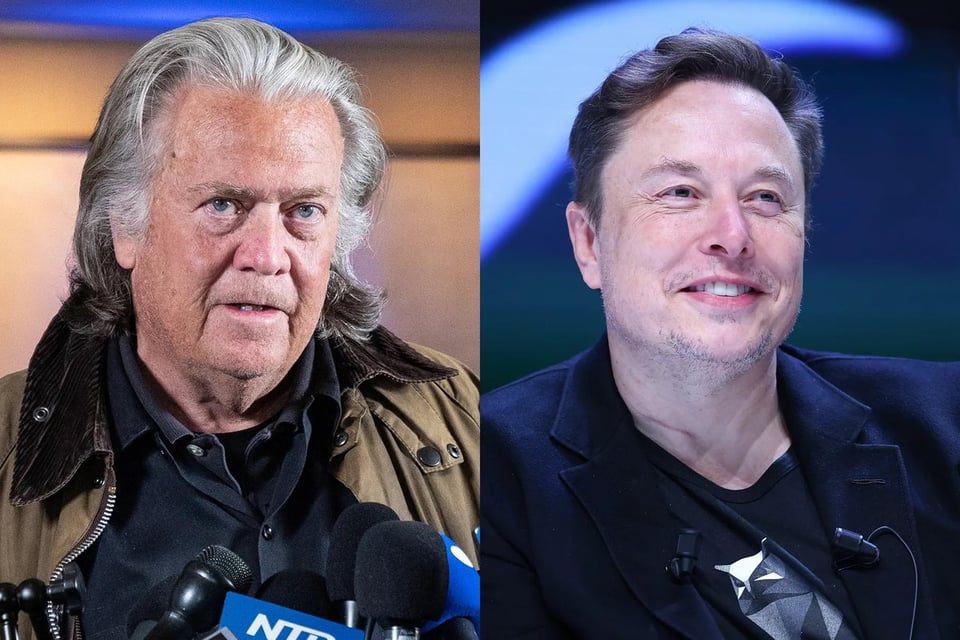
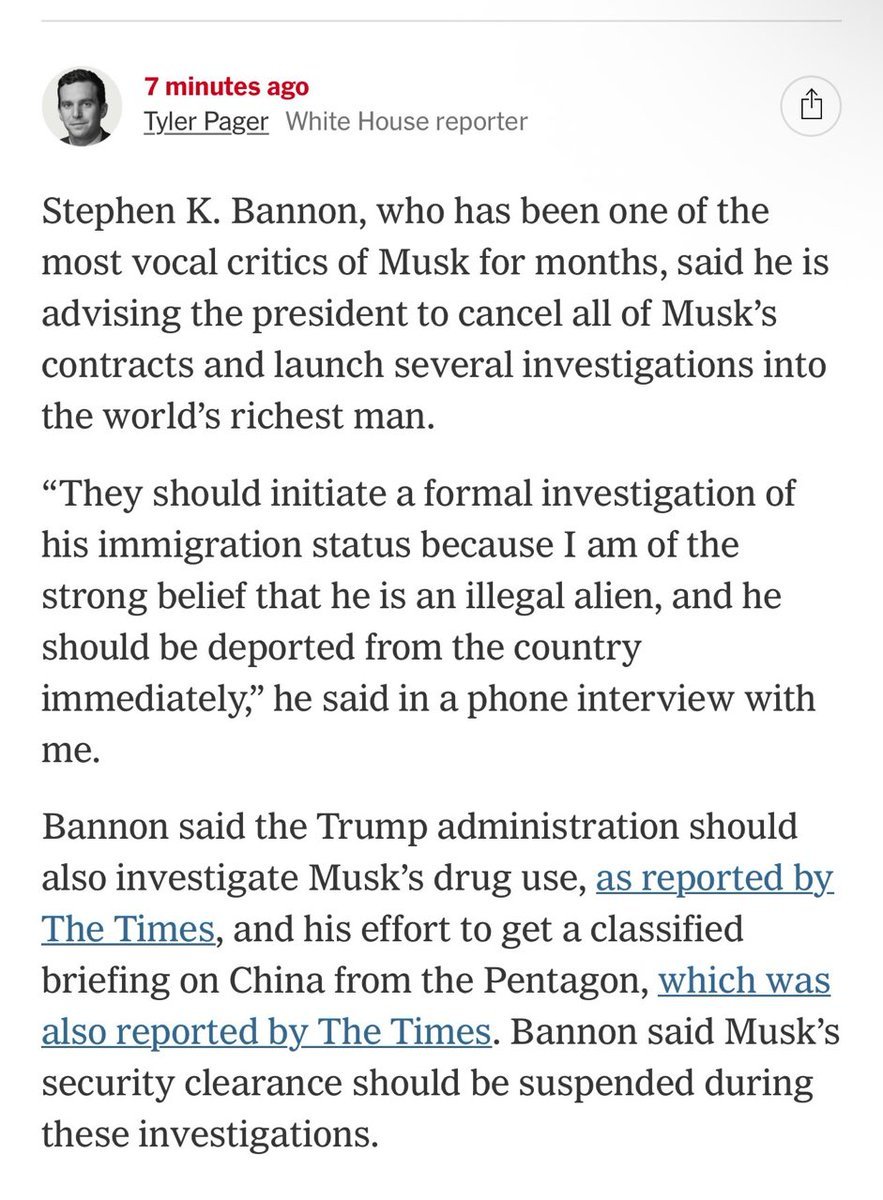
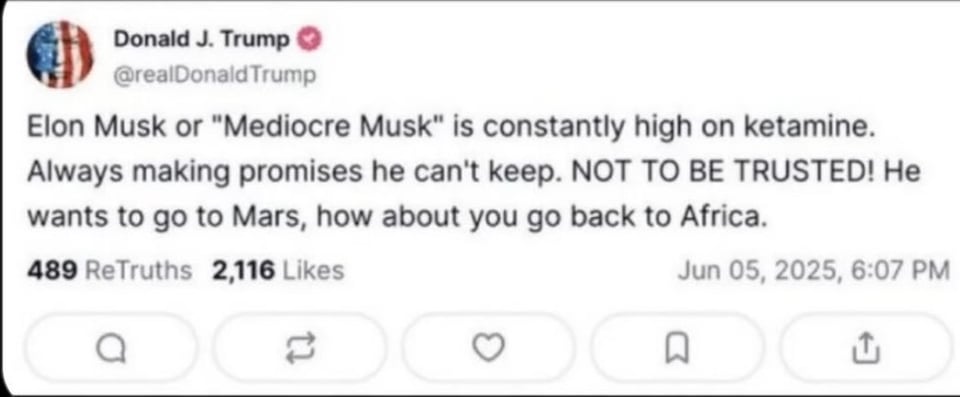
Everything & everyone that Trump touches blows up at some point. Is this the beginning of the end for Tesla as we know it?? "Tesla loses $152 billion in market cap after Musk-Trump spat, biggest hit ever." https://t.co/ZAv41umu8w
— Bob Krause (@KrauseForIowa) June 5, 2025
As two billionaires have a messy public feud, remember this:
— Rep. Jason Crow (@RepJasonCrow) June 5, 2025
Republicans are hellbent on taking away health care & food assistance from working people to give a massive tax break to the wealthiest Americans.
Don't get distracted. https://t.co/jxIBZAQmVb
Great news, not to be ignored.
Used in Covid Shots, mRNA May Help Rid the Body of H.I.V.
A new study shows how the technology deployed in Covid vaccines helped scientists coax the virus out of hiding.

The technology that powered Covid vaccines may also lead scientists to a cure for H.I.V. Using mRNA, Australian researchers said they were able to trick the virus to come out of hiding, a crucial step in ridding the body of it entirely.
The research, published last week in Nature Communications, is still preliminary, and so far, has been shown to be successful only in a lab. But it suggests that mRNA has potential far beyond its use in vaccines as a means to deliver therapies against stubborn adversaries.
Short for messenger RNA, mRNA is a set of instructions for a gene. In the case of Covid vaccines, the instructions were for a piece of the coronavirus. In the new study, they are for molecules key to targeting H.I.V.
Dr. Sharon Lewin, director of the Cumming Global Center for Pandemic Therapeutics in Melbourne, who led the study, called mRNA a “miraculous” tool “to deliver things that you want into places that were not possible before.”
Vaccines deploying mRNA instruct the body to produce a fragment of the virus, which then sets off the body’s immune response. In the United States, the shots were initially hailed for turning back the pandemic, then viewed by some with suspicion and fear. Some officials, including Health Secretary Robert F. Kennedy Jr., have falsely said that they are highly dangerous and even deadly.
Last week, the Department of Health and Human Services sought to limit the vaccine’s availability to pregnant women, children and healthy younger adults. The administration also canceled a nearly $600 million contract with the drugmaker Moderna to develop an mRNA shot for humans against bird flu.
“The fear right now is not rational,” Dr. Lewin said. “mRNA vaccines have been given to millions of people around the world, so we have a very good understanding of their risks.”
The new study describes the use of mRNA as a tool to flush H.I.V. out of its hiding places. Other uses could involve providing proteins missing from those with certain diseases or correcting genetic errors.
Frauke Muecksch, a virologist at Heidelberg University in Germany who was not involved in the work, called mRNA a “promising, absolutely powerful technology.”
Although most people may have only heard of mRNA’s use in science during the pandemic, scientists have been working with it for more than 20 years, she said.
“I think it’s not just therapeutically very powerful, but also for basic science, for research, it opens up a lot of avenues,” she added.
Potent antiretroviral drugs can now control H.I.V., suppressing it to undetectable levels. Still, minute amounts of the virus lie dormant in so-called reservoirs, waiting for an opportunity to resurge. A cure for H.I.V. would involve ferreting out all of this virus and destroying it, a strategy that has been called “shock and kill.”
A significant hurdle is that the virus lies dormant in a particular type of immune cell, called a resting CD4 cell. Because these cells are inactive, they tend to be unresponsive to drugs.
The few drugs scientists have previously used to rouse the virus in these cells were not specific to H.I.V. and had unwanted side effects.
“It’s fair to say the field’s been a little bit stuck,” said Brad Jones, a viral immunologist at Weill Cornell Medicine who was not involved in the latest research.
In 2022, Dr. Jones and his colleagues found that the immune boost from the mRNA vaccines wakened latent H.I.V. in people living with the virus. (Other research has shown that mRNA vaccines also activated dormant viruses including Epstein Barr.)
“You get just a little bit of a gentle nudge with some of these vaccines, and it’s enough to coax some of these latent viruses out so they can be killed,” Dr. Jones said.
Dr. Lewin and her colleagues had for years experimented with other ways to activate H.I.V., but had no luck in resting cells. Seeing the success of the Covid vaccines, which used lipid nanoparticles — tiny spheres of fat — containing mRNA, her team tested similar particles.
They used the particles to deliver two different sets of molecules: Tat, which is adept at switching H.I.V. on, and CRISPR, a tool that can “edit” genes.
The researchers showed that in resting immune cells from people living with H.I.V., the approach coaxed the virus out of dormancy.
“ It’s very, very hard to deal with these cells, so I think this really targeting the right population of cells is what makes this paper special,” Dr. Muecksch said.
It’s unclear whether the new approach can successfully awaken all of the dormant H.I.V. in the body, and what side effects it might produce.
“mRNA will almost certainly have some adverse effects, as every drug does, but we will investigate that systematically, as we do for any new drug,” Dr. Lewin said.
In this case, she said, side effects may be more acceptable to people living with H.I.V. than having to take medications for the rest of their lives.
The researchers plan to test the method in H.I.V.-infected animals next, before moving into clinical trials. (New York Times).